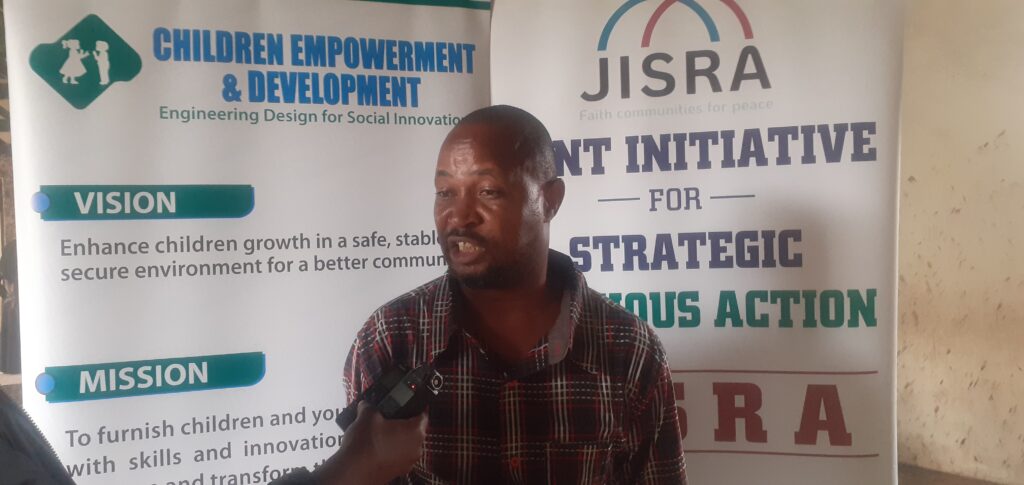By Caroline Katana
Kenya Community Support Centre (KECOSCE) has urged religious leaders in Kenya to be vigilant against the ongoing war between Israel and Hamas.
Since the start of the 2023 Israel–Hamas war on 7 October 2023, numerous attacks have taken place both internally and internationally as part of and in response to the conflict.
These attacks varied from being anti-Semitic, anti-Israel, anti-Muslim, and anti-Palestinian.
Addressing religious leaders during International Day of Freedom of Religion and Belief at Tiwi, Kwale County Joint Initiative Strategic for Religious Action Program (JISRA) officer Mwalimu Rama said since the war started tension has been high on social media platforms.
“Provocations posts are high on social media platforms claiming that rights of the Muslim community in Gaza are violated and if this will not be stopped may cause violence globally,” said Rama.
JISRA officers called upon religious leaders and the community at large to pray for peace and ensure freedom of religion around the globe.
“We are here to sensitize our religious leaders on how to deal with the provocation posts on social media platforms to ensure there is peace, unity, and harmony in our country, so I believe they will be peace ambassadors,” added Rama.
At the same time, he has condemned the protests that are taking place in Kenya under the pretext of standing with the Palestinian nation, saying that they may undermine the security of this country.
“I want to urge those in solidarity with Palestinians to hold peaceful demonstrations so as to avoid tension and violence because we all remember in 2006 the same war happened and there was an attack in Kenya following religious differences, so I urge security agencies and religious leaders to be more vigilant in promoting peace,” emphasized Rama.
Tiwi Peace champion Bebi Khamis called upon the national government to mark the international day of freedom of religion and belief for it has great significance to the society.
“It is so unfortunate that the national government is silent about this important day that seeks to bring peace and unity among believers, freedom of religion and belief is vital to every citizen so it is very important for the communities to be sensitized about this important day that seeks compatibility,” said Bebi.
On his part, Athman Bundo, a peace ambassador, urged the community to stop spreading hateful and divisive messages on social media and instead use the platform for beneficial purposes.
“Let us use social media to preach peace as well as online business to get income and promote our livelihood instead of using the platform to build hatred and violence, peace should be our number one priority,” said Bundo.
Children make up more than 40 percent of the more than 8,000 people confirmed to have been killed in Gaza.
More than 6,000 children have been injured in Gaza since the war began.
Overall, at least 1,400 Israelis and foreign nationals have also been killed in Israel, mostly in the surprise attack by Hamas on October 7.
Genesis of the conflict
The conflict pits Israeli demands for security in what it has long regarded as a hostile Middle East against Palestinians’ aspirations for a state of their own.
Hamas rejects the two-state solution and is sworn to Israel’s destruction.
On Nov. 29, 1947, the United Nations General Assembly agreed on a plan to partition Palestine into Arab and Jewish states and for international rule over Jerusalem.
Jewish leaders accepted the plan giving them 56 percent of Palestine’s land.
The Arab League rejected the proposal.
Israeli founding father David Ben-Gurion proclaimed the modern state of Israel on May 14, 1948, establishing a safe haven for Jews fleeing persecution and seeking a national home on land to which they cite deep ties dating to antiquity.
A day later, troops from five Arab states attacked Israel and Israeli forces operating in areas the U.N. had proposed for Arab rule.
Palestinians lament Israel’s creation as the Nakba, or catastrophe, asserting it resulted in their mass dispossession and blocked their dreams of statehood.
Israel contests the assertion that it drove Palestinians from their homes.
In the war that followed, some 700,000 Palestinians, half the Arab population of what was British-ruled Palestine, fled or were driven from their homes, ending up in Jordan, Lebanon and Syria as well as in Gaza, the West Bank and East Jerusalem.
Armistice agreements halted the fighting in 1949 but there was no formal peace.
Palestinians who stayed put in the war and their descendants today make up about 20% of Israel’s population.
Major wars in Israel
In 1967, Israel made a pre-emptive strike against Egypt and Syria, launching the Six-Day War.
Israel captured the West Bank and Arab East Jerusalem from Jordan, the Golan Heights from Syria and the Gaza Strip from Egypt.
An Israeli census that year put Gaza’s population at 394,000, at least 60% of them Palestinian refugees and their descendants.
In 1973, Egypt and Syria launched a surprise attack on Israeli positions along the Suez Canal and Golan Heights, touching off the Yom Kippur War.
Israel pushed both armies back within three weeks.
In 2005 Israel unilaterally withdrew settlers and soldiers from Gaza. But Gaza saw major flare-ups of fighting in 2006, 2008, 2012, 2014, and 2021.
Israel invaded Lebanon in 1982 and thousands of Palestinian fighters under Yasser Arafat were evacuated by sea after a 10-week siege, Israeli troops pulled out of Lebanon in 2000.
In 2006, Lebanon’s Iran-backed Hezbollah militants captured two Israeli soldiers in the volatile border region and Israel launched military action, triggering a six-week war.
Besides wars, there have been two Palestinian intifadas, or uprisings, in 1987 to 1993 and 2000 to 2005.
During the second, Hamas carried out suicide bombings against Israelis, and Israel waged tank and air strikes on Palestinian cities.
Attempts of peace
In 1979, Egypt and Israel signed a peace treaty. In 1993, Israeli Prime Minister Yitzhak Rabin and Arafat, the Palestine Liberation Organization leader, shook hands on the Oslo Accords on limited Palestinian autonomy. In 1994, Israel signed a peace treaty with Jordan.
U.S. President Bill Clinton, Israeli Prime Minister Ehud Barak and Arafat took part in the Camp David summit in 2000, but failed to reach a final peace deal.
In 2002, an Arab League plan offered Israel normal relations with all Arab countries in return for a full withdrawal from the lands it took in the 1967 Middle East war, the creation of a Palestinian state and a “just solution” for Palestinian refugees.
The presentation of the plan was overshadowed by Hamas, which blew up an Israeli hotel full of Holocaust survivors during a Passover Seder meal.
Further peace efforts have been stalled since 2014 when talks failed between Israelis and Palestinians in Washington.
Palestinians boycotted dealings with the 2017-21 administration of U.S. President Donald Trump after it reversed decades of U.S. policy by refusing to endorse the two-state solution – the peace formula that envisages a Palestinian state established in a territory that Israel captured in 1967


